Brexit from the inside: MP’s views on how it will impact pharma

With the potential for a hard-no-deal Brexit becoming closer to reality with each passing day, the question of what this means for healthcare and pharma is ever more prominent. To gain some clarity on the potential outcomes, public affairs and communications specialist Portland questioned Westminster MPs and Members of European Parliament* in an attempt to answer the fundamental question: How will Brexit impact healthcare and pharma across Europe and in the UK?
The report, published by Portland, revealed that 51% of MPs and 35% of MEPs believed trade barriers resulting from Brexit could impact the supply of medicines to patients. And although only 14% of MPs and 16% of MEPs believed the pharma sector should take priority in Brexit negotiations, nearly half of all MPs (49%) and 56% of MEPs believed that patients should be given greater priority in the negotiations.
John Clarke, director at Portland, said: “From the outside - and indeed from the inside - Parliament appears to be a cacophony of chaos. Are MPs really listening to anyone at the moment? Will they listen to pharmaceutical companies on Brexit?”
“Our polling reveals that MPs (40%) do want to engage with pharma companies. However, there is a gaping divide between what Conservative and Labour MPs think Brexit will really mean for pharma.”
Is patient centricity the key to post-Brexit stability?
According to the report, for MPs, the patient is the focus, but paradoxically so. While nearly half of all MPs believed that patients should be given greater priority in the Brexit negotiations, just 14% agreed that the pharmaceutical industry should be prioritised by negotiators, despite the importance of effective medicine provision in modern healthcare.
Therefore, the data can be interpreted to show that the more industry aligns with and addresses patient interests, the more likely it is to get a hearing from those who are shaping the Brexit negotiations.
The Medicines and Healthcare products Regulatory Agency (MHRA) has recently published technical guidance on what a Brexit implementation period means for the life sciences sector, once the Withdrawal Agreement is finalised.
According to the document, firms will continue batch release testing, which will be recognised by the EU and vice versa, as will be manufacturing, distribution and inspection licences. Current marketing authorisation holders based in the UK will still have access to member states markets, and new marketing applications from UK-based pharma companies will be examined through either the European Medicines Agency’s centralised or decentralised procedure.
In response, Dr Sheuli Porkess, deputy chief scientific officer for the Association of the British Pharmaceutical Industry, said: “Pharmaceutical companies need as much clarity as possible, so they can continue to supply medicines to patients as the UK leaves the EU.”
[caption id="attachment_45402" align="alignleft" width="106"] Sheuli Porkess[/caption]
Sheuli Porkess[/caption]
“This guidance from Government is welcome, as is the reiteration of the UK’s preference for close cooperation with the EU across all aspects of medicines regulation.”
"There are still some unanswered questions. We are clear that there needs to be an implementation period but whether there will be one is still subject to negotiation.”
The document also states that the future role of the MHRA, whose expertise is vital, is also still being discussed.
"The industry will continue to plan for all scenarios, including ‘no deal’. We believe that the best way to protect patients and public health is for the EU and UK to agree continued cooperation on the regulation of medicines."
Europe will feel the impact of a hard Brexit
[caption id="attachment_45516" align="alignleft" width="101"] Stefan Gijssels[/caption]
Stefan Gijssels[/caption]
Stefan Gijssels senior advisor at Seboio, Public Affairs & Reputation Management in Brussels, commented on the current situation in the EU: “Some simplifications have been made, such as the establishment of the European Medicines Agency (EMA), a single body to approve new medicines.”
“The EU made it easier for companies to ship goods between EU countries without customs and tariffs. So, Brexit will definitely create an increased bureaucracy for approvals and more hurdles to cross for international imports and exports with the UK, which will ultimately result in tax-payers’ money being used less efficiently. Yet the question remains: will it really matter for patients?”
According to Portland’s report, it may not, the UK already makes pricing and licencing decisions on a national basis, which may mean that within these areas, little change will be felt.
“Taking oncology as an example, of all the cancer medicines launched in the European Union in the last five years, the outcomes of appraisals by UK authorities have completely differed from the rest of Europe. Further, fears that costs of treatments will rise due to additional bureaucracy caused by Brexit are misplaced. These factors will not determine the ultimate prices of medicines in the UK”, added Gijssels.
What Brexit is going to change significantly is the environment for health research. Today’s annual investment is €4 billion, to which UK contributes 36%. The level of UK spending is not likely to change once it leaves the EU, which means the EU will have to increase its research investment if it wants to maintain its position globally in terms of public research.
According to Gijssels the EU’s biotech market will also shrink after Brexit with 55% of all European biotech venture capital being located outside the EU in the UK and Switzerland.
View from the US: uncertainty
Alfred Jackson, partner at Portland in Washington, USA said: “When it comes to Brexit, most Americans are not paying much attention. Sure, we heard about Brexit when the referendum happened in 2016 and we know it means that the UK will no longer be a part of the EU.”
“If we listen to National Public Radio (NPR) we are aware that Parliament wants a meaningful vote, that there has been a dramatic upheaval in Theresa May’s Government and that someone with a mash up of Bernie Sanders’ and Donald Trump’s hair recently resigned as Foreign Secretary.”
[caption id="attachment_45517" align="alignleft" width="92"] Alfred Jackson[/caption]
Alfred Jackson[/caption]
According to Jackson, pharma pays much closer attention to Brexit than most Americans, however, it is not clear if there are any ongoing preparations. Probably because it is not clear what to prepare for.
“We do know that one thing will emerge from Brexit: uncertainty. We recognise that the most likely disruption will be to the supply chain, that there will be a physical border between the EU and the UK that might lead to new inspections, customs delays, tariffs and other new expenses.”
“We know that the European Medicines Agency is moving to Amsterdam, but we are not yet certain of the impact of that move on UK approvals and access. We are conscious that Brexit could have a significant impact on the NHS, but we don’t yet know what that impact will be.”
What can pharma do?
The survey results revealed the scale of work still to be done by the industry, patients and the broader health community to bring pharma’s concerns to the forefront of Brexit negotiations.
[caption id="attachment_45518" align="alignleft" width="87"] Aleksandr Al-Dahir[/caption]
Aleksandr Al-Dahir[/caption]
Aleksandr Al-Dahir, healthcare public affairs specialist at Portland suggests: “Among MEPs, our polling demonstrates low willingness to engage with pharma on Brexit, with only 26 per cent willing to do so. Given this group’s sway over the Brexit outcome, it is important that the industry finds new messages with which to capture their attention and increase their willingness to act.”
According to Al-Dahir, the European Parliament cannot see alignment between the priorities of patients and pharma, suggesting that by working with patient groups in Europe pharma has a chance to increase its credibility in Brexit negotiations and therefore reaching the same goal: certainty on how medicines will be safely and quickly supplied after Brexit.
Little time remains to influence the negotiations before the UK either leaves without a deal or strikes an uncertain compromise, taking both sides into the transition period. Either outcome presents significant risks to future research, medicines manufacturing and, ultimately, patients.
Porter states in the report: “The healthcare sector must engage negotiators on both sides of the Channel to communicate their priorities and place these at the heart of Brexit talks. Pharmaceutical companies will play a key role in this, lending their expertise to support and inform decision makers across Europe to deliver market certainty to business and timely treatment access to patients.”
“As negotiations come to a head, now is a critical moment for the sector to engage Brussels and Whitehall with positions that truly cut through the white noise of Brexit. Otherwise, as our findings demonstrate, the industry as a whole risks being side-lined amid the chaos.”
*Report research methodology
The MP polling was conducted through YouGov and was completed in two phases. The first, run in January 2018 canvassed 100 MPs, including 39 from the Conservative Party, and 53 from the Labour Party. The second took place in June, and was completed by 100 MPs, including 36 from the Conservative Party and 52 from the Labour Party.
The MEP polling was commissioned through ComRes and was run from March to May 2018 with a total of 76 respondents.












